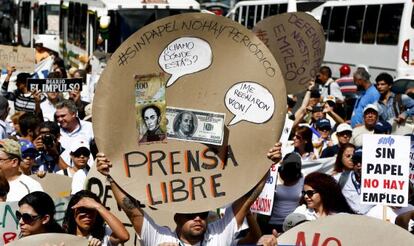Venezuelan currency controls bring newspaper presses to a halt
Maduro threatens to “tighten rules” to stop media coverage of soaring crime

“The final hour will come for newspapers” boomed Venezuelan President Nicolás Maduro last Friday during a public event in Miranda state. “They have called me a dictator, but I am going to tighten the rules that will put a stop to this yellow journalism and propaganda that feeds only death.”
With this threat — one of the most intimidating speeches he has made in his 11-month presidency — Maduro has made it clear that he wants the private Venezuelan media to stop reporting on the nation’s soaring crime rate, which is becoming the chief threat to his plans of carrying out the Bolivarian revolution mapped out by his late predecessor and mentor, Hugo Chávez.
Maduro’s threat is only a small part of the complex situation the press faces in the country. Publishers have been unable to obtain dollars to import newsprint for their publications because they cannot get the necessary government-authorized permits. While many of them have completed the 17 bureaucratic steps to obtain the hard cash they need under the tight currency control regime in place since 2003, the permits have still been held back by the government.
For example, the Caracas daily El Nacional, one of Venezuela’s most important newspapers, received its last permit in May. And, as what has occurred with other publications in the capital, El Nacional has had to reduce by half the number of pages it publishes.
What we are doing is paying for imports with our own money; it is the government that has to authorize this”
Because of the shortages, about 11 newspapers have shut down their presses.
The National Press Workers Union (SNTP) — Venezuela’s largest labor organization grouping all workers in the media — held a massive march from the center of Caracas on Tuesday to the offices of the Foreign Trade Center (Cencoex), which in January was also given regulatory power over currency exchange. SNTP members demanded that Cencoex issue their media companies the permits so that they can resume imports of newsprint. But Cencoex’s director, Alejandro Fleming, refused to meet with them.
The few hundred press-sector protestors were able to pull together a broad representation of managers from the most important newspapers across the country, such as El Impulso of Barquisimeto in Lara state. SNTP officials warn that about 30,000 workers across Venezuelan stand to lose their jobs if no newsprint is brought in soon.
National Assembly speaker Diosdado Cabello called the press workers’ protest an attempt to destabilize the country. “Let the newspapers buy their own newsprint. The government doesn’t owe them anything,” he said on Monday.
But El Nacional editor and publisher Miguel Enrique Otero said that this wasn’t the case.
“It is true that the government doesn’t owe us money,” he said in response to Cabello’s comments, “because we are not asking for a loan. What we are doing is paying for imports with our own money, but under the current rules of play, it is the government that has to authorize this and give us the dollars.”
According to newspaper officials, the government is refusing to release 100 million dollars for the purchase of newspaper that dailies are willing to pay.
Tu suscripción se está usando en otro dispositivo
¿Quieres añadir otro usuario a tu suscripción?
Si continúas leyendo en este dispositivo, no se podrá leer en el otro.
FlechaTu suscripción se está usando en otro dispositivo y solo puedes acceder a EL PAÍS desde un dispositivo a la vez.
Si quieres compartir tu cuenta, cambia tu suscripción a la modalidad Premium, así podrás añadir otro usuario. Cada uno accederá con su propia cuenta de email, lo que os permitirá personalizar vuestra experiencia en EL PAÍS.
¿Tienes una suscripción de empresa? Accede aquí para contratar más cuentas.
En el caso de no saber quién está usando tu cuenta, te recomendamos cambiar tu contraseña aquí.
Si decides continuar compartiendo tu cuenta, este mensaje se mostrará en tu dispositivo y en el de la otra persona que está usando tu cuenta de forma indefinida, afectando a tu experiencia de lectura. Puedes consultar aquí los términos y condiciones de la suscripción digital.








































